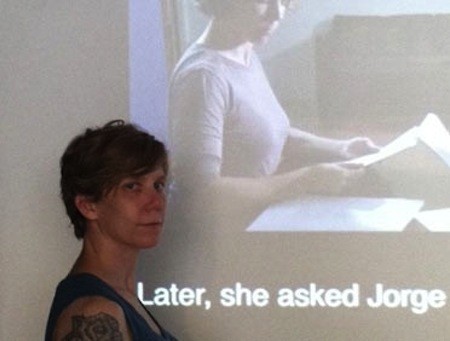On small press publishing

There are three things I want to tell you about publishing and community.
First.
Increasingly, I see publishing as the act of making language public. That action may result in a book, a broadside, a postcard, a wall installation, or an audio tour. In any case, it results in something that can be experienced away from the body of the “writer.” Publishing includes curation and framing. Always. If I print 100 copies of my beautiful new poem, and pass these poems out to you, then I am publishing within a frame. There is the size of the paper, the color, the font, the layout. The method of delivery. I pass a single sheet of paper out to you at an academic conference. I may send several sheets of paper in the mail, paper that is perfect bound, trimmed, covered, and called a book. I may sell that book to you at the AWP book fair, at LitFest Pasadena, or at a reading. I may put a postcard in that book, a postcard printed with a line from a poem by Jennifer Karmin, and when you send that postcard in the mail, you help me publish too.
Les Figues publishes books. We also curate events, which we often record. We have worked in other capacities too. We have participated in extended residencies and/or collaborations with other organizations, such as Los Angeles Contemporary Exhibitions and the Metabolic Studio.
There is more to say, but let me conclude this first point here: the form of the publication affects the content, and distribution is part of the form.
Second.
On the subject of community: I like the idea of community, but the idea of community requires the obedience or consent of its members. Community is made through agreement. People agree to a set of values; they agree to enforce those values as a community. The community is considered good. The pursuit of the ideal is considered good. When a group has an idea of “good” as something abstract and separate from individual actions, then individuals may begin to act in perfectly horrible ways and call it good. They may act horribly in the name of good, and so language becomes violent.
We must consider both ideas and actions. Theory and praxis. She may say she loves the people, but how does she treat the folk? (Another question: who does she count amount the folk?)
In the lovely, beautiful world of poetry, community is an ideal. Poets love their communities; we are at a conference about emergent communities. Community has both an economic value and a social value. For poets, the ability to speak the discourse of community is a career asset.
Community is often the most that we have. Community is a feeling. And I like to feel.
Third.
The mission of Les Figues is not to publish per se, but to create conversations between readers, writers, and artists. Publication creates one kind of conversation between a reader and a writer. There are other conversations too, and I consider all of these to be the work — the idea and practice — of Les Figues.
Tuesday:
1. Confirm time and format with Q.E.D. writers/participants Lincoln Tobier, Brian Teare, and Michael du Plessis.
2. Fill orders. Pick postcard to include in package. Consider the purchase and which other book they may like.
3. Talk to Melissa Buzzeo about her performance on violence and community at Naropa. Oh, it sounds like it was very good!
4. April, current intern, coming in today. She really likes to hand-make books and use the spiral-binding machine. Perfect.
5. Go to Metabolic Studio. Meet with Terence and Janet about distribution of Preserving a Home for Veterans. Finish preparing cover files, and give files to Larry for making plates. Double check that plates came out good. Double check Larry’s make-readys. Figured out that Larry printed about a quarter of a million sheets in order to make this book.
6. Yes, Coco and Matias. Let’s standardize the comma format.
7. Interview interns, along with board member Amy Hood.
8. Hire summer interns. Super excited about this upcoming group.
9. Read Elizabeth Hall’s edits of Trisha Low’s introduction to Lividity. Wonderful, Elizabeth. Wonderful, Trisha.
10. Continue.
This paper was presented at the Emergent Communities conference, University of California, Santa Cruz, May 4, 2012, at 2:30 p.m.
A conference companion
Edited byKatie L. Price Jonathan Fedors